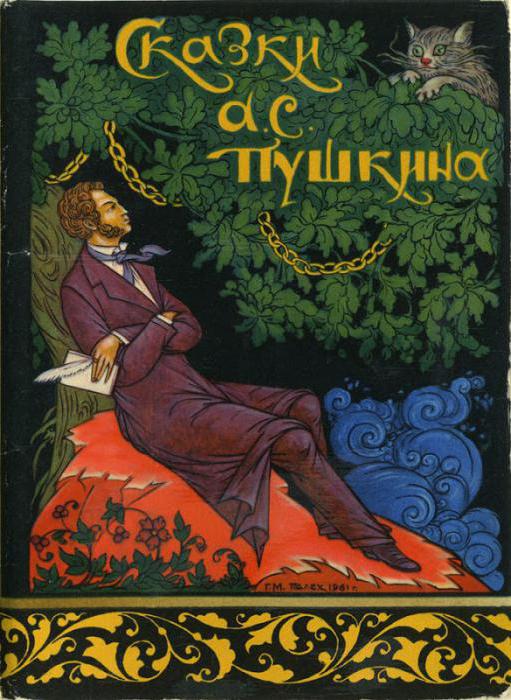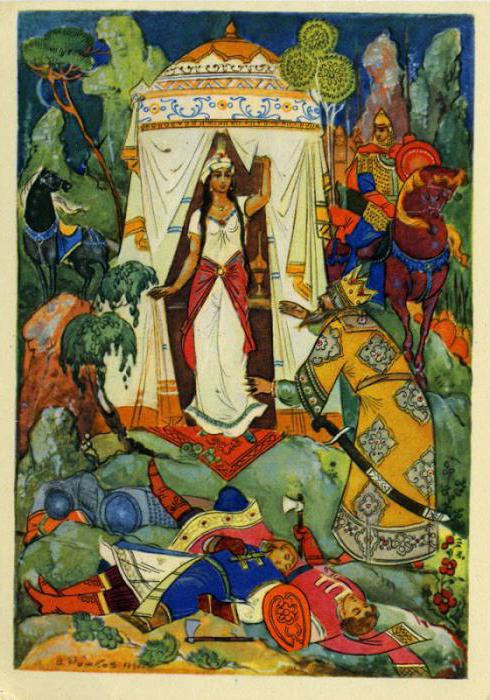The role of the folk tale in the work of our writers of the 18th - early 19th centuries and Alexander S. Pushkin in particular is great. The element of folk songs, epics and tales permeated the life of the peasant from birth to death. And this area of folk poetry has surrounded A.S. Pushkin since childhood. The poet wrote his tales for at least 20 years.
The connection of A. Pushkin and folk poetry
For Pushkin, these were not passive retelling of plots, not just entertaining adventures of heroes with love affairs, but the introduction of social issues into them. An example is the greedy pop and his sharp-witted peasant. They talk about ideal moral standards of behavior ("The Tale of the Dead Princess"). All fairy tales by A. S. Pushkin differ from the folk primarily by poetic speech. Some, earlier, are written in the authentic folk language, when the poet becomes like a folk storyteller.

Other, later, tales of A.S. Pushkin are written in literary verse, chorea. He, along with storytellers, modifying plots, introducing new heroes, borrowing something from the folklore of other countries, creates a new Russian fairy tale, but preserving its national flavor. Nobody wrote anything like this again. Adults know almost all fairy tales from childhood, returning to them again when their own children and grandchildren are growing up, but only an in-depth analysis can reveal what is hidden behind the plot.
The worst scary story
In which of Pushkin's tales will we find so many deaths? How relevant is the tale of King Dodon at all times! The phantasmagoric picture of the death of the empire and the disappearance of the dynasty was painted in 1834. At the end of this story there are piles of dead bodies, which there is no one to bury. One crow is circling above them. The fiction contains a hint and a lesson for the survivors: do not allow war, especially fratricidal.
Loss of control
The brave and cocky king Dodon always attacked his neighbors from a young age. Sparing no one, he waged wars of conquest. Aging, the ruler was tired and wanted peace. But it was not there. The neighbors, feeling the emperor’s weakness, began to attack him from all sides. The old ruler did not know how to protect his country from raids.
Therefore, he turned for help to a wise astrologer. This step, as it turns out later, turned out to be fatal.
Miracle bird
At first, everything seems to be going fine. King Dodon received a magical golden cockerel as a present. This bird not only notifies that one of the enemies violated the borders, but, turning in the right direction, loudly reports which side the attack will be from. So the monarch managed to send his troops outside the country and prevent robberies in his kingdom. Everyone now knew that this state would not allow insolence and would give a timely rebuff. Peacefully and calmly flowed life.
The result obtained at the end of life
The turbulent youth spent by the foolish King Dodon taught him nothing. He did not conclude peace treaties with neighbors or trade, but only trashed other people's troops. The ruler did not feel any repentance for the sins of youth. He did not change to old age, rejoicing at every victory of his army. Lazy and negligent, he believed that he was always right in any situation. Throughout the tale, his character does not change.
Behind The Scenes Of A Sage's Help
When King Dodon was at an impasse, the eunuch-sage, taking a bird out of the bag, helped the king fix the situation in such a way that the monarch himself did not spend any energy and did not make mental efforts for this. The guard of the capital, the cockerel, magically collected all the information and did not fall silent until the governors woke the king and went on a campaign.
But the inhabitants of the capital were very afraid of the cries of a
magic bird, because they were faced with battles and death. The ruler, in order to live serene and sleep, turning from side to side, had to calm the people. Practically for the life of the country it was not needed. All that was needed was an astrologer, a prophetic cockerel and governors who fought with enemies. Or even less - a cockerel and its master sage, who himself could give instructions to military commanders. The king was honored, but in fact he was useless. This is how King Dodon is described. Pushkin, following the folk tradition, did not change the tsarist character for the better.
The Golden Cockerel
In addition to the sage, whose thoughts the reader did not know and which have remained a mystery, is a riddle and a golden cockerel, the bird is bright, shining and sunny. In Slavic beliefs, roosters can scare away evil spirits. They were embroidered as a talisman or placed over the ridge of the roof for the same purpose. This kind bird, which King Dodon finally made to avenge the death of his master. The golden cockerel, having seen that the tsar had paid evil to the stargazer for good, flew off the weather vane, pecked the tsar at the crown and flew away to no one knew where.
Who was the enemy of the state
In fact, it was not foreign troops and nations that represented the danger, namely the unlimited tyrant and his children. After all, it was from the tsar’s actions in his youth that bloody wars began, which could not end at all. But rebuffing attacks from all sides, the tyrant healed calmly for a year or two. And suddenly, frightening the whole capital and turning east, he screamed a cockerel. The king sent from the kingdom of darkness and darkness to light from the east at the head of the army of his eldest son. And everything became quiet. Eight days passed, and again also turning east to the light, the cockerel predicted trouble. To help the eldest son, the old monarch sends the younger. Another eight days pass, and again grief - the cockerel also screams, turning to the east. Then Dadon himself leads the third army. And what does he see?

Dead are both sons who fought among themselves. Meanwhile, the tent swung open and a beautiful girl came out - a radiant evening dawn, the appearance of which foreshadowed the death of King Dodon. Pushkin compares the girl with the sun, and the king with the bird of the night, which means his days are declining. Seeing her, the king forgot the death of his sons. He feasted with her and took her to the capital. The queen magically possessed power over all men, and everyone wanted to possess it: the young princes, who had forgotten their relationship and killed each other, and the aged king, and even a priest who could have no interest in women. And when the ruler killed the stargazer, who requested the promised payment, the whole people shuddered: the beautiful queen is not light and sun, but death itself.
Evil is rooted in autocracy. Fantastic forces destroy him, but how should it be in life? A. Pushkin suggested that the reader learn a lesson on his own. This is probably why the last couplet when printed in the first edition was removed.